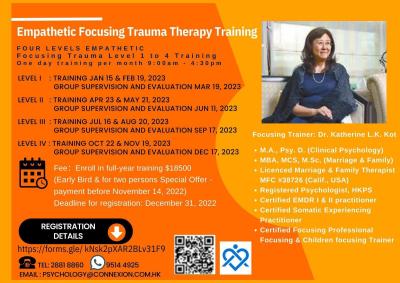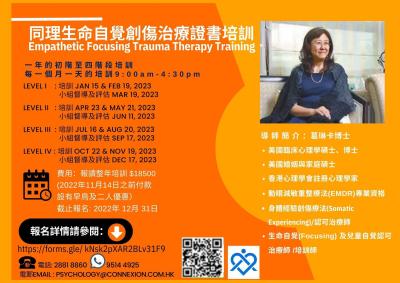Your Hosts


Where & When
Any one interested can enrol into below link:
https://forms.gle/kNsk2pXAR2BLv31F9
The details of the zoom link will be shared after registration.
Training structure 培訓架構:
9:00 am to 4:30 pm One day training every month 9:00 am to 4:30 pm 每一個月一天的培訓
. Level I: Training January 15 & February 19, 2023
Group supervision and evaluation March 19, 2023
. Level II: Training April 23 & May 21, 2023
Group supervision and evaluation June 11, 2023
. Level III: Training July 16 & August 20, 2023
Group supervision and evaluation Sept 17, 2023
. Level IV: Training October 22 & November 19, 2023
Group supervision and evaluation Dec 17, 2023
** If participants unable to join for certain days, they can review the recording instead, yet must first apply. 如果參加者因為特別原因或時差未能夠參加某次的培訓,可以重溫錄製的影帶代替出席,必須事先申請。
Attendees:Social workers, medical staff, psychologists, social workers, counselors, pastoral workers, etc.
對象: 社工、醫護人員、心理學家、社會工作員、輔導員、牧靈工作者等
語言 Language:
Cantonese/ English 廣東話/英語
Practicum hours: 25 hours as a Focuser + 25 hours as a Listener
** During this period, participants must be able to arrange Focusing practice with another participant in person or online according to their preferences every week. Participant will continue to receive timely professional feedback from the trainer at each stage, which can be used in subsequent practices.
實習時數: 25小時作為自覺者 + 25小時作為聆聽者
** 在此期間,參與者必須每週可以根據自己的喜好安排親自或網上與另一位參與者進行自覺練習。參與者將在每個階段中不斷收到來自培訓師的即時專業反饋,可以將回饋在應用在之後的練習裏。
Continuous learning: WhatsApp groups between participants and instructors/facilitators and coordinators are set up to ask questions, share their practice and clinical experience. This is also a place for instructors/facilitators to reply and answer questions.
持續學習: 開設學員與導師和協調員之間的WhatsApp 群組,供學員提問,和分享練習和閱讀心得和體會。這裡也是導師和協調員分享和回答提問的地方。
Participants need to sign in in the morning and afternoon of each training and minimum requirement of
85% of attendance.
每次出席培訓需要分上、下午簽到,最少出席課程要有八成半或上。
After completing one year of training and evaluation, participant will be awarded the "Proficiency as Focusing Partner" (PFP) qualification by the International Focusing Institute. This is for those who wish to continue learning/experiencing in Focusing and hope to accumulate more Focusing experience as their first goal.
完成一年的培訓及經過評核後,可獲 International focusing Institute 頒發 "Proficiency as Focusing Partner" (PFP) 資格,這是讓有意繼續學習/體驗更多有關自覺,並且希望類積更多自覺經驗的人而訂的首個目標。從課程中技巧的學習及發展,能提昇您對自覺的認識、能力及經驗。
同理生命自覺創傷培訓 Empathetic Focusing Trauma Training
本課程為體驗式學習,以學員親身體驗為主,輔以理論,讓學員更能領悟理論中的含意。此外,學員與導師的互動,包括問與答、分享,能作個別學員的自我提昇。
This course is through experiential approach, mainly based on the participant's personal experience, supplemented by theory, so that participant can better understand the meaning of the theory. In addition, the interaction between the participants and the instructor, including question and answer, and sharing, can be used for the self-improvement and learning for each individual participant.
The focus of the Level 1 - 4 Courses 初階至四階課程重點
Focus of Level 1 training:
1. Basic concepts of Eugene Gendlin
2. The classic 6 steps of Focusing
3. Basic Focusing attitude
4. Learn how to clear the inner space and connect to the real inner space
5. Explore "Felt Sense"-the core of Focusing
6. Be kind to your emotions, be with your emotions, instead of getting caught in
them
7. Recognize and learn Focusing listening skills
8. The practice and resonance of the connection with one’s "Felt sense"
初階培訓重點
1. Eugene Gendlin 的基本概念
2. 生命自覺經典的 6 步
3. 基本的自覺態度
4. 學習如何清空內在空間,接上真實的內在
5. 探索 “意感” —— 生命自覺的核心
6. 善待自己的情緒,“與” 情緒共相,而不是陷入其中
7. 認識及學習自覺聆聽技巧
8. 與 “意感” 的聯繫的操練及共鳴
二階培訓重點
1. 創傷治療 (SE) 的概念
2. 操練同在和安全及建立內在安穩點
3. 學習深度聆聽,開放和接受自己內在的感受,增加對自己和他人的同理心
4. 如何停留在創傷模糊的邊緣,支持對方
5. 如何克服內在被卡在某處、團團轉、毫無寸進的焦慮
6. 學習尊重自覺者的需要,讓她/他做決定的空間,耐心面對内在的受傷
7. 學習一套有能力支持自己和支持別人的聆聽方法
8. 找到與傷痛共處最佳距離,以同理接納的態度去接受每一個身體的訊息
Focus of Level 2 training:
1. The concept of trauma therapy (Somatic Experiencing)
2. Practice grounding and safety and establish inner stability
3. Learn to listen deeply, open up and accept your inner feelings, and increase
empathy for yourself and others
4. How to stay on the verge of trauma and support your focuser
5. How to overcome the anxiety of being stuck, turning around and around,
making no progress
6. Learn to respect the needs of the focuser, give her/him space to make decisions,
and patiently wait the injured sensation to emerge
7. Learn a set of listening skills capable of supporting yourself and focuser
8. Find the best distance to stay with the pain, and accept every message from the
body with an attitude of empathy and acceptance
三階培訓重點
1. 幫助對方組織創傷的碎片
2. 通過正在形成的意感來接近創傷的經歷。
3. 遵循由意感產生的變化步驟,一步步連接身體的訊息
4. 允許流程完成其步驟和整合在進入下一階段之前
5. 聆聽時,如何不讓自己內裡被觸痛的傷處成為阻礙
6. 遇到阻力、困難時如何克服感覺身體,失去意感或衝突的部分等。
7. 處理創傷停滯的迷思
Focus of Level 3 training:
1. Help the focuser organize the fragments of trauma
2. Approach the traumatic experience through the emergence of Felt Sense.
3. Follow the steps of change produced by the Felt Sense and step by step
connect with the body's message
4. Allow the process to complete its steps and integrate before proceeding to the
next stage
5. When listening, how to prevent the painful experience from becoming a
barrier
6. When encountering resistance, how to overcome the difficulties arising from the
body, losing consciousness or internal conflict, etc.
7. Dealing with stagnation-- the myth of traumatic long-lasting symptoms
四階培訓重點
1. 處理內在矛盾平衡痛苦和自我阻隔,以及創傷影響的自我挫敗、放棄行為
2. 當它到來時,識別並整合生命前進的動力
3. 處理過程中遇上障礙,包括自我批判、疑惑、渴睡、難以集中.
4. 如何穿過複雜表面,放下規條,回到生命自覺最關鍵、單純的核心
5. 接收並整合身體意感的體驗帶來的“反應”及聆聽感受底下更深層的“需要、期望、和想躲
避的東西
6. 如何與多種負面感受同在而不受其干擾?
7. 整合:重新連接和前進--從負面經驗中找到正面的意義,讓生命有創意地、邁出新的一步
Focus of Level 4 training:
1. Deal with internal contradictions: balancing pain and self-protective mechanism,
as well as self-defeating and giving up behaviors affected by trauma
2. When it comes, identify and integrate the driving force of life
3. How to handle the obstacles encountered in the healing process, including self-
criticism, doubts, drowsiness, difficulty concentrating.
4. How to work through the complex surface, let go of the defenses, and return to
the most critical and simple core of Focusing
5. Receive and integrate the "reactions" brought about by the experience of Felt
Sense and listen to the deeper "needs, expectations, and things you want to
avoid" underneath the experience
6. How to handle multiple negative feelings without being disturbed by them?
7. Integration: Reconnect and move forward -- find the positive meaning from the
traumatic experience, let life creatively flows and takes a new step
Registration Information and Price
報名須知 Enrolment info:
